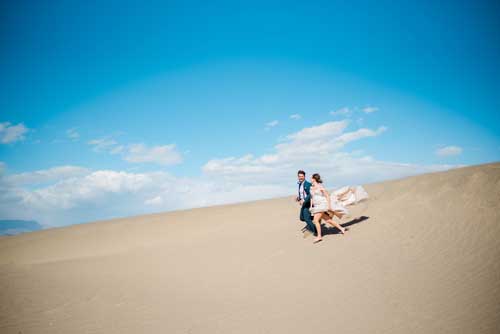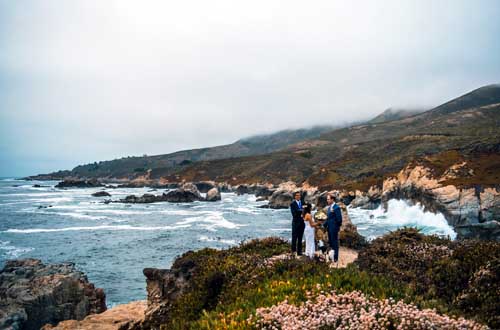
What Is an Elopement?
What Is an Elopement?
While a lot of people are accustomed to the idea of a traditional wedding, the truth is that times have changed, and, especially after Covid, more couples are having elopements or intimate weddings than ever before. However, many people still don’t quite know or understand what it actually means to elope, so I wrote this blog to help clear things up!
So, what does it mean to elope and is it a good idea? Let’s find out!
While a lot of people are accustomed to the idea of a traditional wedding, the truth is that times have changed, and, especially after Covid, more couples are having elopements or intimate weddings than ever before. However, many people still don’t quite know or understand what it actually means to elope, so I wrote this blog to help clear things up!
So, what does it mean to elope and is it a good idea? Let’s find out!
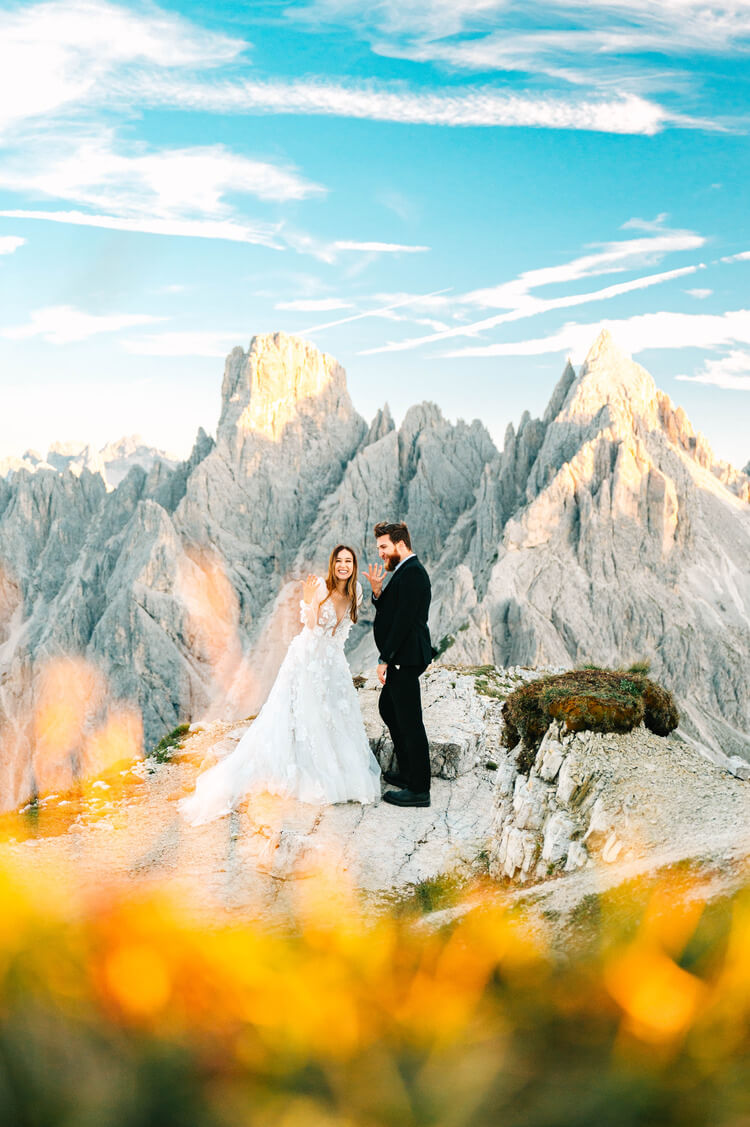
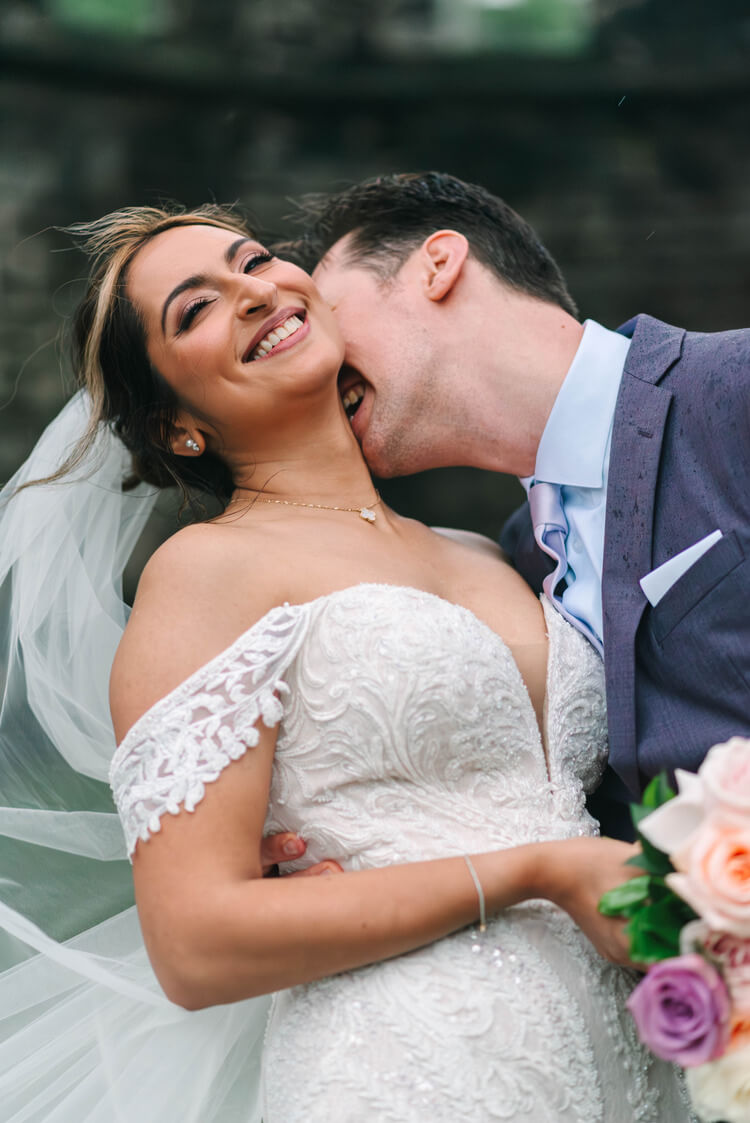


What Does it Mean to Elope?
Generally speaking, an elopement is an intimate, non-traditional way of getting married. It no longer means sneaking off in the dark of night, even though some couples still choose to marry in secret. Many people now make marriage announcements, either before or after, and some even hold a reception with family and friends at a later date, so everyone still gets a chance to celebrate together.
Modern elopements can take various forms. While some couples choose to marry privately, others plan intimate ceremonies with a small group of close friends and family. Elopements are often associated with simplicity, intimacy, and spontaneity, and they provide couples with an opportunity to prioritize their relationship and commitment to each other without the pressures or expectations of a traditional wedding.
Elopements have become increasingly popular for couples who prefer a more personal and meaningful wedding experience, free from the stress, expense, and logistics of a larger ceremony. They can take place in a wide range of locations, from picturesque outdoor settings to intimate venues, and they offer couples the freedom to tailor their wedding day to reflect their unique personalities and preferences.
What Does it Mean to Elope?
Generally speaking, an elopement is an intimate, non-traditional way of getting married. It no longer means sneaking off in the dark of night, even though some couples still choose to marry in secret. Many people now make marriage announcements, either before or after, and some even hold a reception with family and friends at a later date, so everyone still gets a chance to celebrate together.
Modern elopements can take various forms. While some couples choose to marry privately, others plan intimate ceremonies with a small group of close friends and family. Elopements are often associated with simplicity, intimacy, and spontaneity, and they provide couples with an opportunity to prioritize their relationship and commitment to each other without the pressures or expectations of a traditional wedding.
Elopements have become increasingly popular for couples who prefer a more personal and meaningful wedding experience, free from the stress, expense, and logistics of a larger ceremony. They can take place in a wide range of locations, from picturesque outdoor settings to intimate venues, and they offer couples the freedom to tailor their wedding day to reflect their unique personalities and preferences.
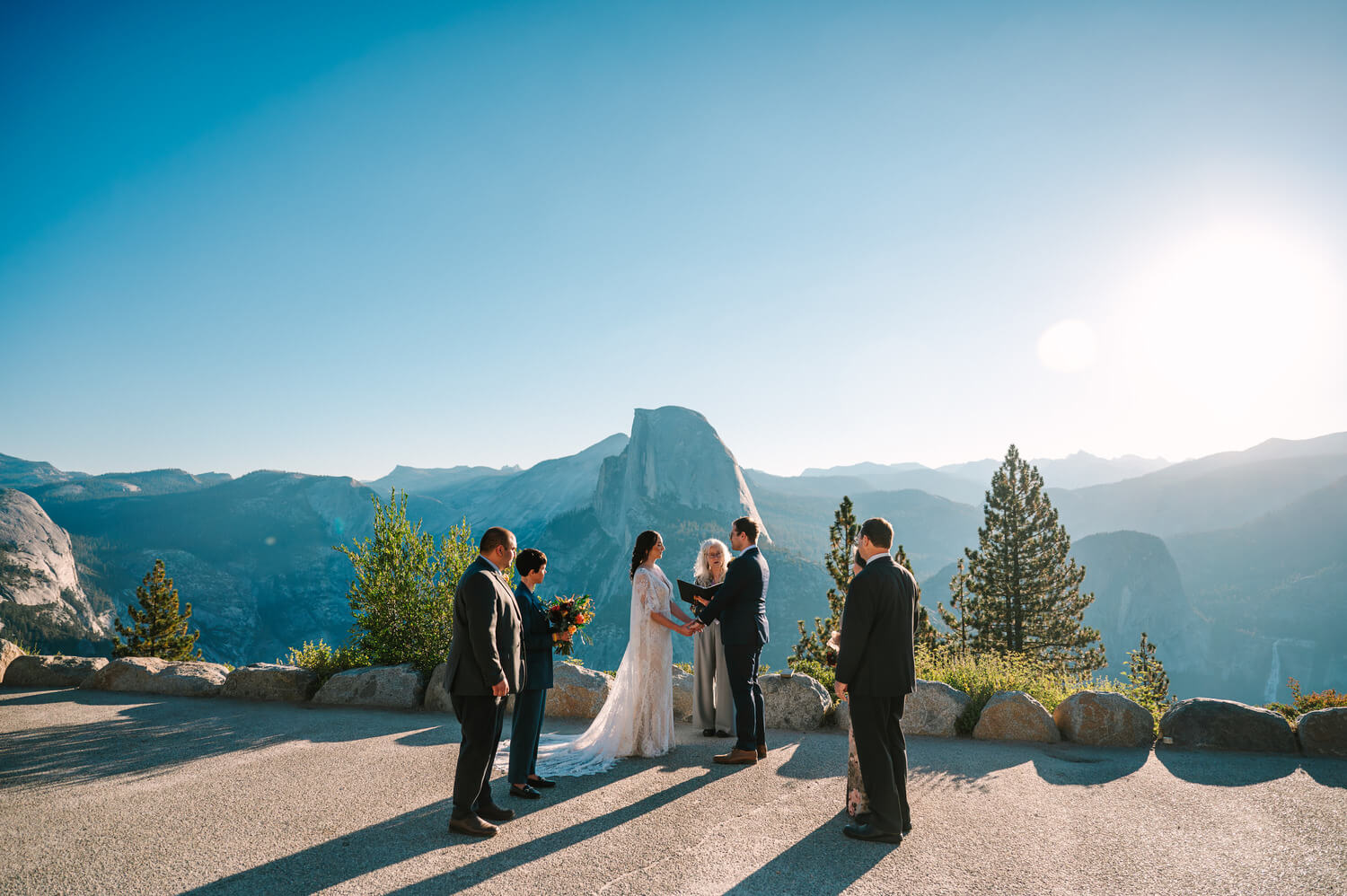
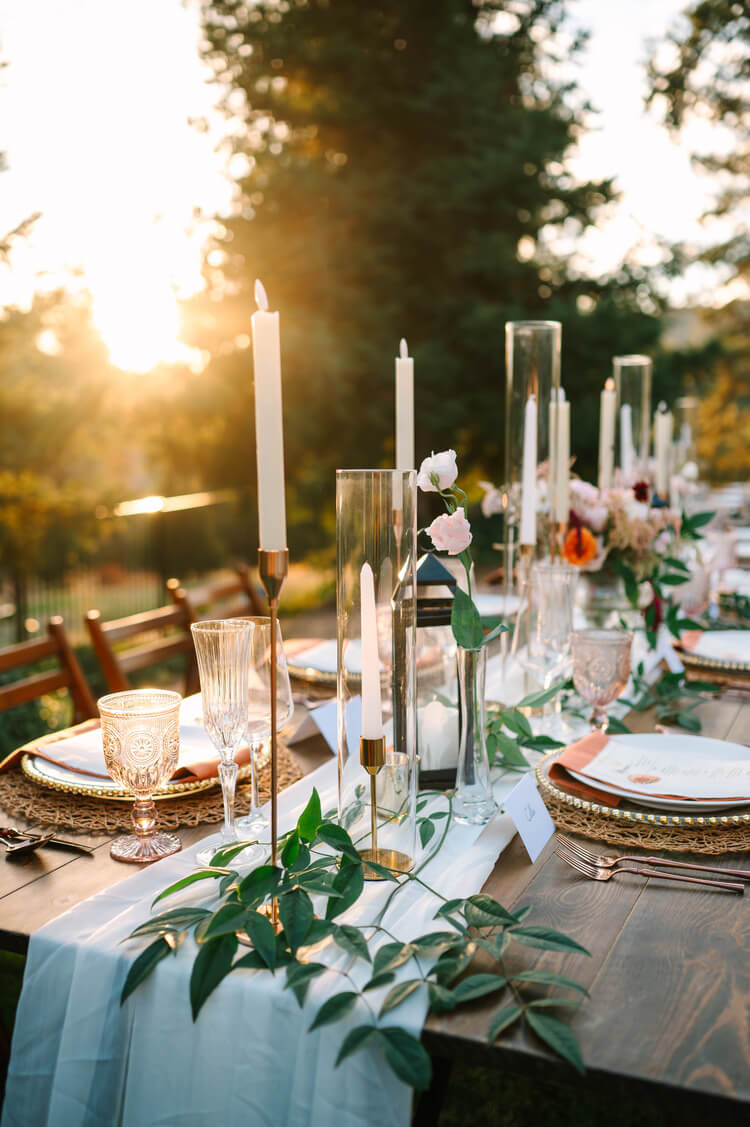
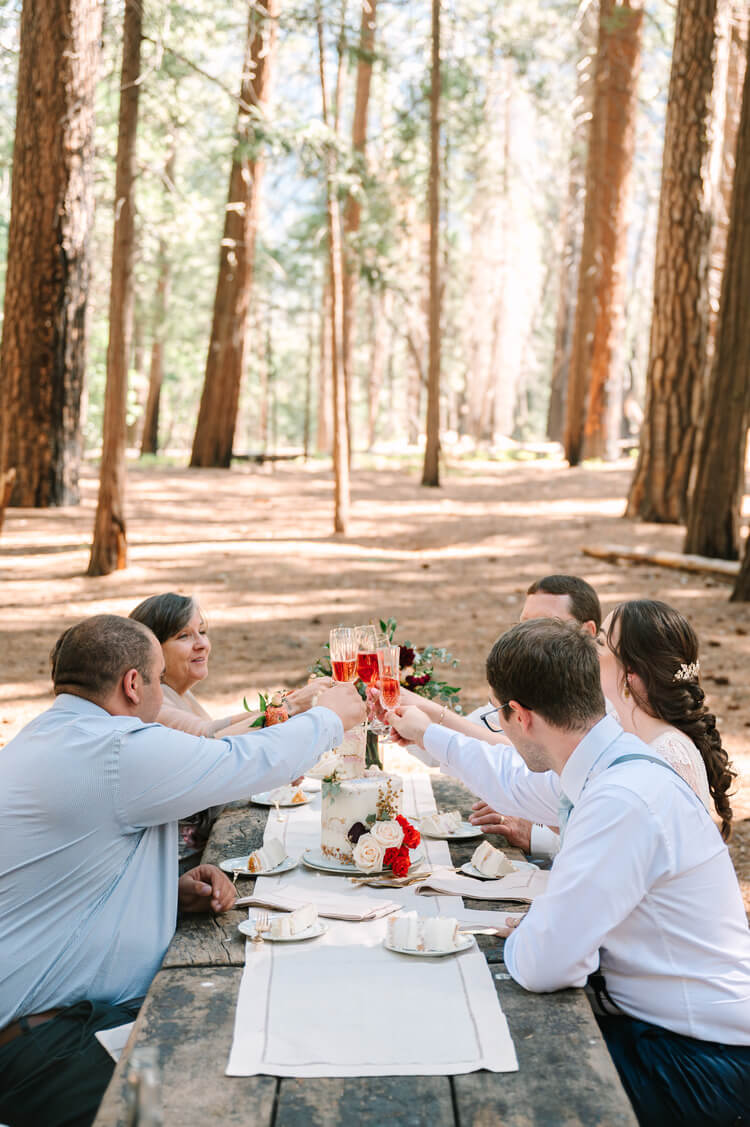
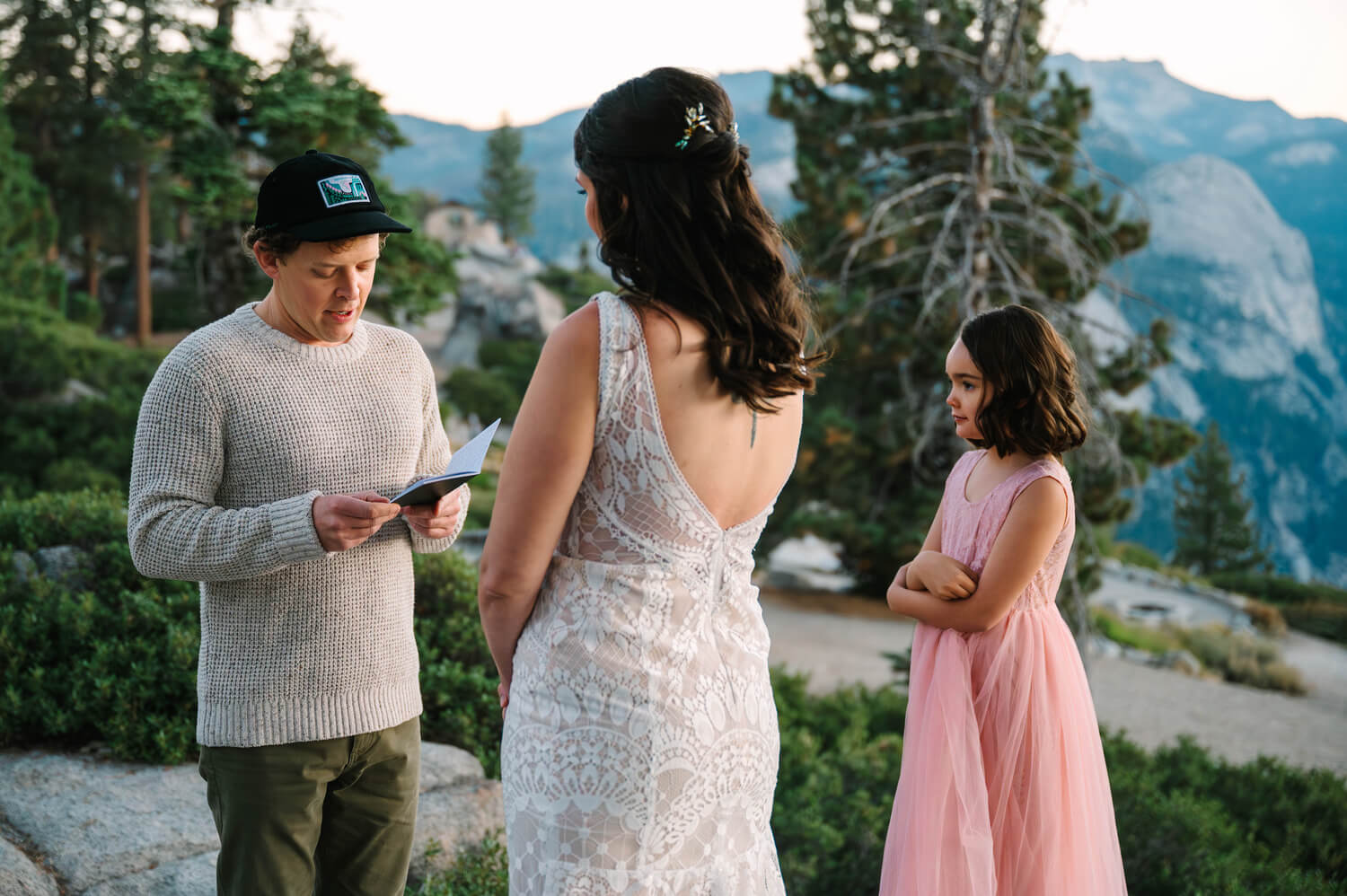
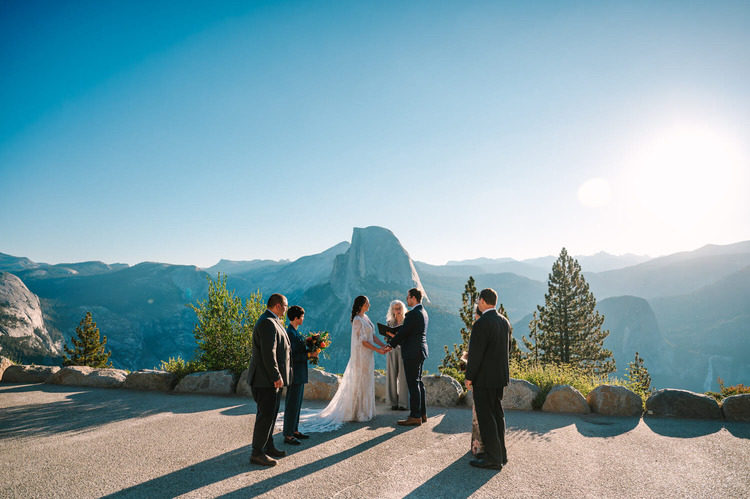


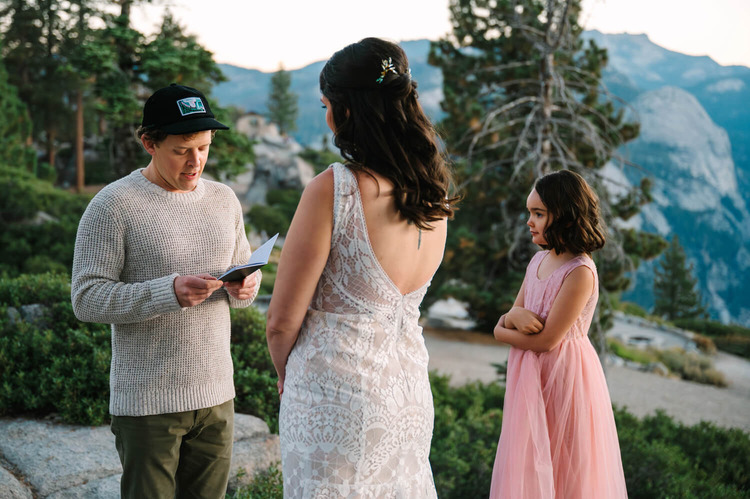
The Difference Between a Traditional Wedding and an Elopement
What’s the main difference between an elopement and a traditional wedding? It all comes down to the number of guests. I consider an elopement to be just the couple or up to 15 people in total. An intimate wedding is 16-35 attendees, 35-50 guests is a small wedding, and anything beyond that is a full wedding. If you’re unsure if you want to elope or have a bigger event, this blog post might help with that decision!
The Difference Between a Traditional Wedding and an Elopement
What’s the main difference between an elopement and a traditional wedding? It all comes down to the number of guests. I consider an elopement to be just the couple or up to 15 people in total. An intimate wedding is 16-35 attendees, 35-50 guests is a small wedding, and anything beyond that is a full wedding. If you’re unsure if you want to elope or have a bigger event, this blog post might help with that decision!
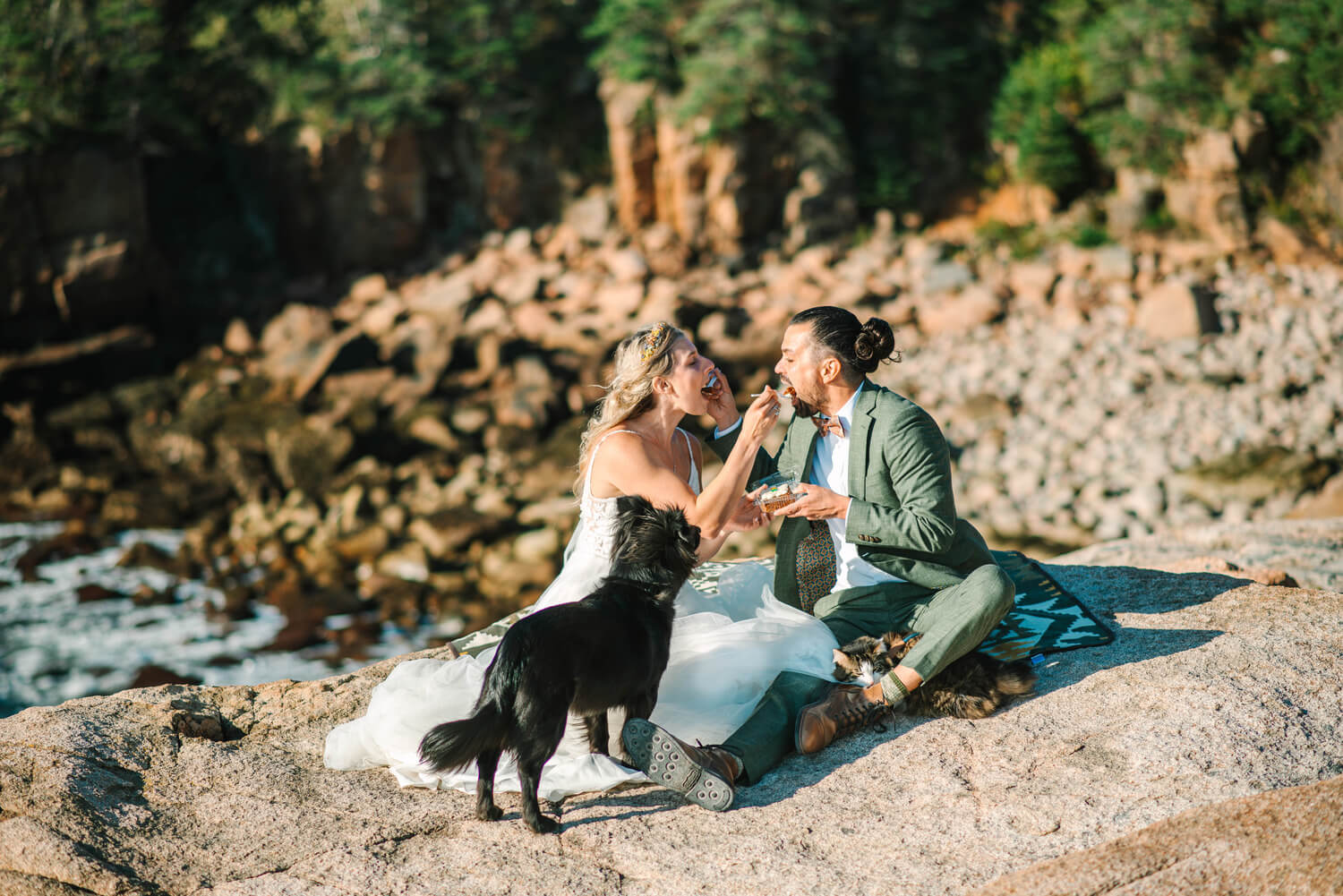
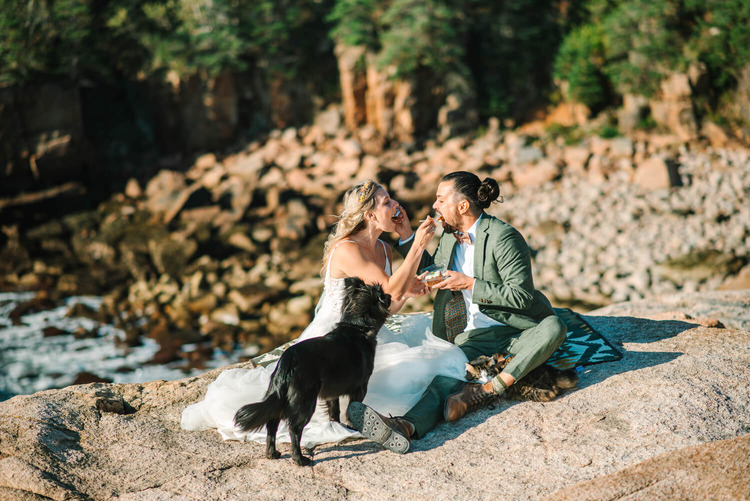
Why Do Couples Elope?
There are many so different factors that lead couples to choose an elopement. As an introvert, the idea of being the center of attention for a whole day (plus the rehearsal dinner) made me feel sick to my stomach. I knew I’d just be miserable the whole time, having to force a constant smile to hide my natural RBF and ugh, SO much small talk! Plus, I just couldn’t imagine devoting a ton of energy to details that weren’t important to us. Did I want to spend hours trying to decide on different types of chairs, plates, and tablescapes? Nope! Nor did I want the drama and cost that comes along from having a big wedding—and luckily my now-husband fully agreed!
Elopements prioritize intimacy, allowing couples to focus solely on each other without the pressures or distractions of a larger wedding. Choosing a secluded or private location enhances this sense of closeness, creating a special and meaningful experience for the couple. Couples may also opt for locations that hold personal significance to them, whether it’s a place they’ve always dreamed of visiting together, a location that reflects their shared interests, or a venue that holds sentimental value.
Why Do Couples Elope?
There are many so different factors that lead couples to choose an elopement. As an introvert, the idea of being the center of attention for a whole day (plus the rehearsal dinner) made me feel sick to my stomach. I knew I’d just be miserable the whole time, having to force a constant smile to hide my natural RBF and ugh, SO much small talk! Plus, I just couldn’t imagine devoting a ton of energy to details that weren’t important to us. Did I want to spend hours trying to decide on different types of chairs, plates, and tablescapes? Nope! Nor did I want the drama and cost that comes along from having a big wedding—and luckily my now-husband fully agreed!
Elopements prioritize intimacy, allowing couples to focus solely on each other without the pressures or distractions of a larger wedding. Choosing a secluded or private location enhances this sense of closeness, creating a special and meaningful experience for the couple. Couples may also opt for locations that hold personal significance to them, whether it’s a place they’ve always dreamed of visiting together, a location that reflects their shared interests, or a venue that holds sentimental value.
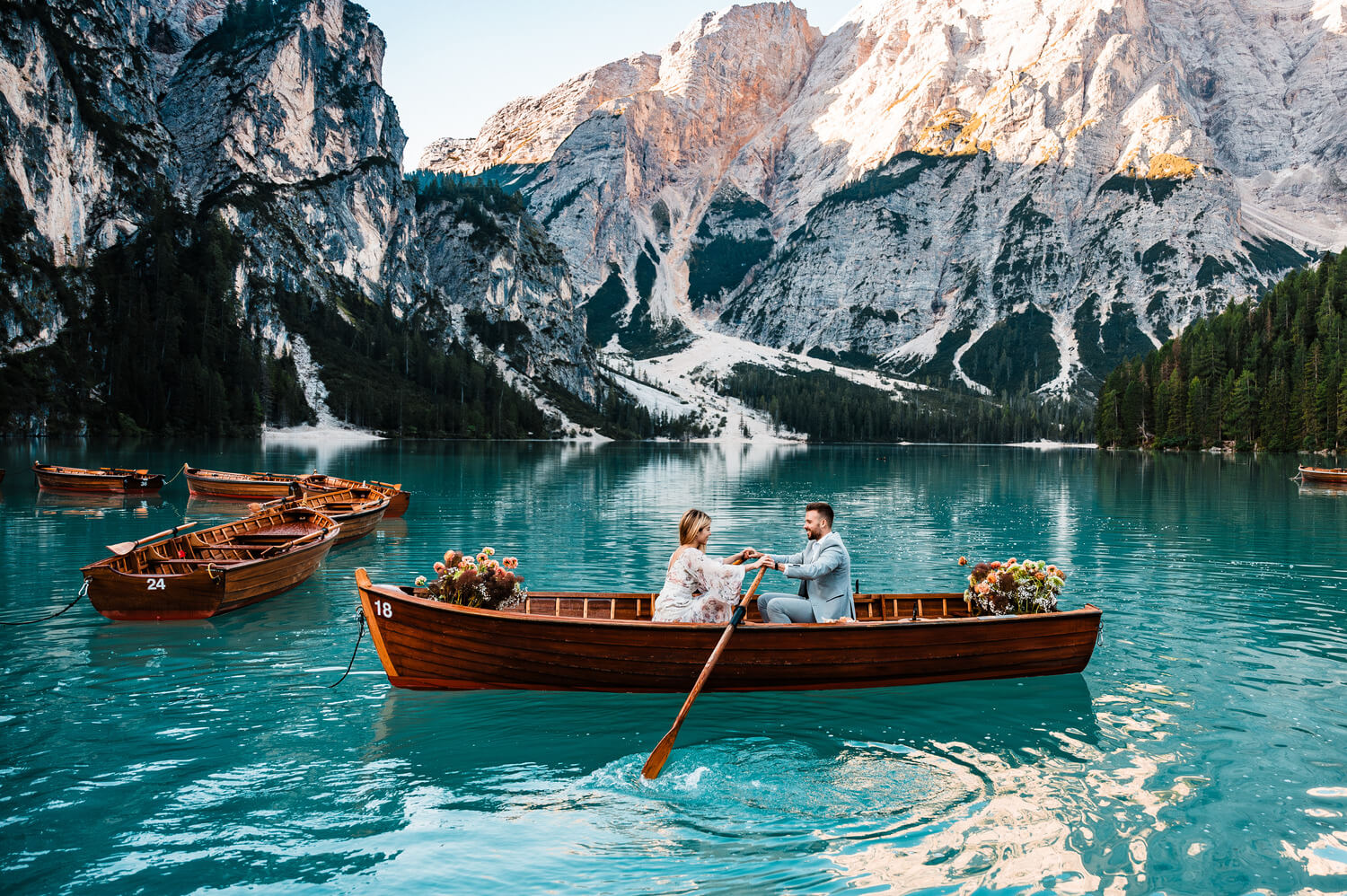
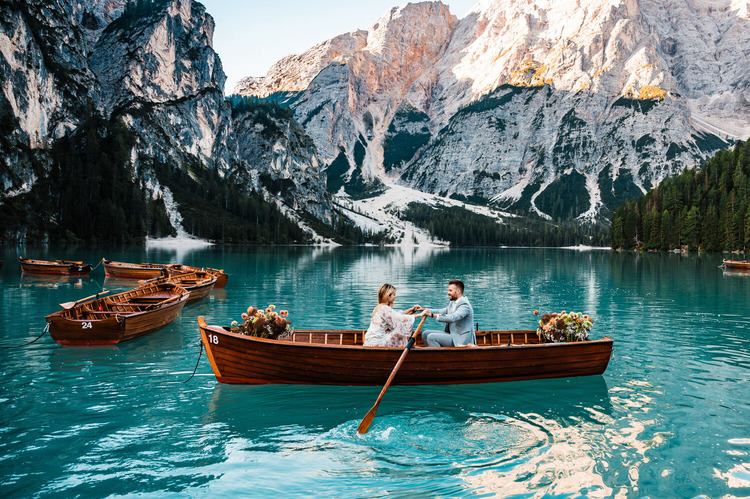
For others, they want to celebrate their love in an exotic or adventurous location so they can create lasting memories and share this unforgettable experience in a unique setting. When you don’t have to plan around the schedules and needs of others, you can more easily exchange vows in a beautiful location with minimal logistical stress.
Then there are other reasons like family issues or financial constraints that lead couples to elope privately. There’s no denying that the more guests you have, the more expensive the wedding becomes—along with an increased chance of family drama. By eloping, you don’t have to worry about making sure everyone else is happy and you can splurge on what’s most important to you—a great photographer (Hi!), a luxury hotel, a private chef catered meal, a helicopter ride to an epic lake. The options are truly endless!
For others, they want to celebrate their love in an exotic or adventurous location so they can create lasting memories and share this unforgettable experience in a unique setting. When you don’t have to plan around the schedules and needs of others, you can more easily exchange vows in a beautiful location with minimal logistical stress.
Then there are other reasons like family issues or financial constraints that lead couples to elope privately. There’s no denying that the more guests you have, the more expensive the wedding becomes—along with an increased chance of family drama. By eloping, you don’t have to worry about making sure everyone else is happy and you can splurge on what’s most important to you—a great photographer (Hi!), a luxury hotel, a private chef catered meal, a helicopter ride to an epic lake. The options are truly endless!
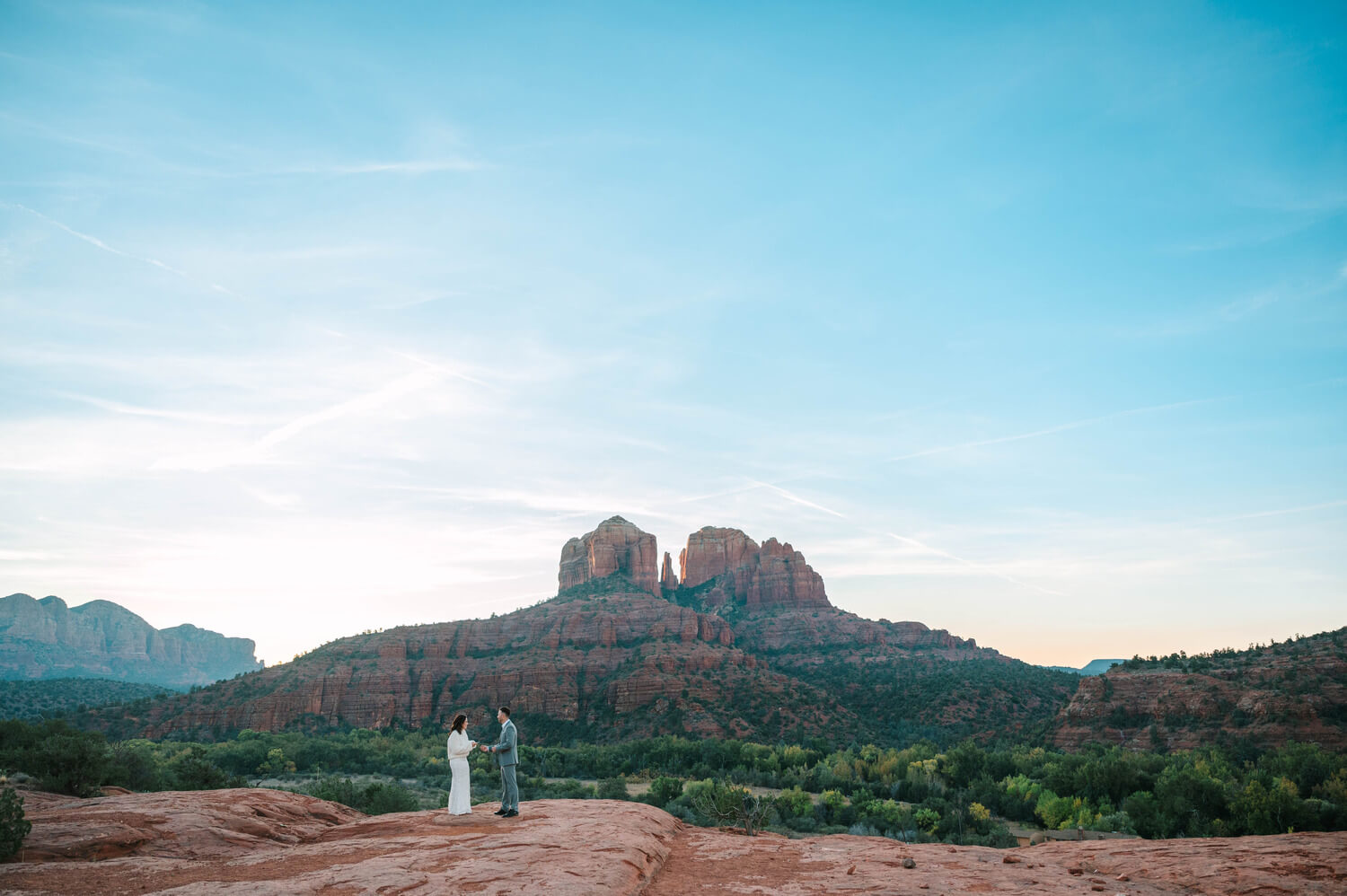
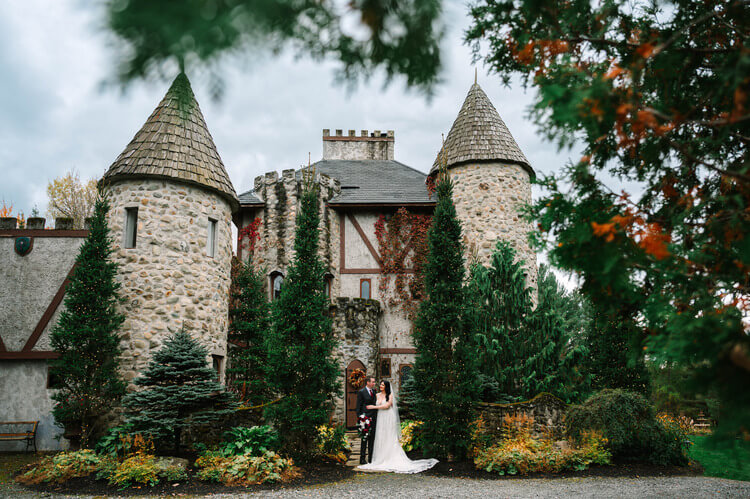
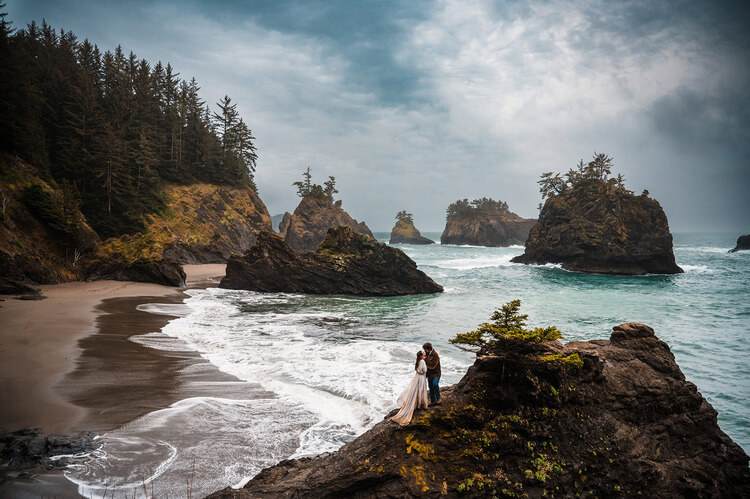
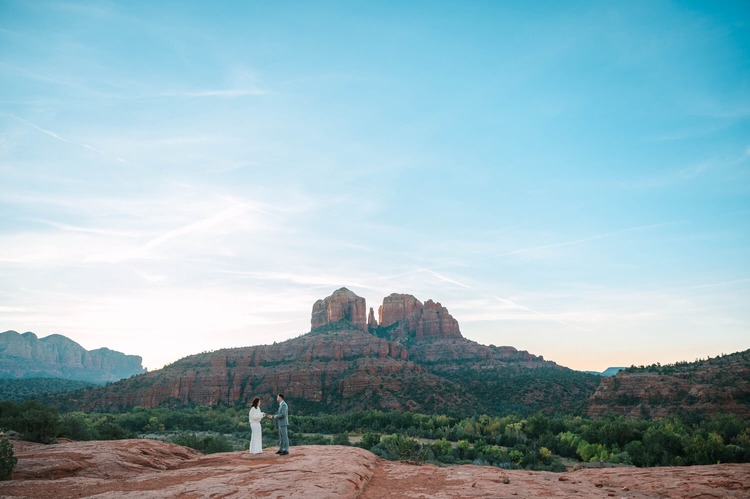


Where Should We Elope?
There really are so many different places where you can elope! You can have an adventurous elopement, a semi-adventurous elopement (where the views are still epic but you didn’t have to hike super far to achieve them), a city elopement, a backyard elopement, and a courthouse elopement (just to list a few).
Here’s a more detailed list of the different environments where couples typically elope:
- Natural Settings: This includes beaches, mountains, forests, or fields. Natural settings offer breathtaking scenery and a sense of intimacy with nature. Couples might choose these locations for their romantic and picturesque backdrops, providing a serene and tranquil atmosphere for their special day.
- Urban Landscapes: Cities, parks, rooftops, or city halls are popular choices for couples seeking a more modern and cosmopolitan elopement experience. Urban settings offer a blend of sophistication and vibrancy, with iconic landmarks or skyline views providing memorable backdrops for the ceremony.
- Historic or Architectural Sites: Castles, ruins, historic buildings, or gardens provide a sense of timeless elegance and charm. Couples might be drawn to these locations for their rich history, architectural beauty, and the sense of grandeur they offer, creating a romantic and memorable setting for their elopement.
- Destination Locations: Exotic destinations, such as tropical islands, European cities, or remote villages, offer couples the opportunity to combine their elopement with a memorable travel experience. These locations provide a sense of adventure and escapism, allowing couples to create unforgettable memories in a unique and idyllic setting.
- Intimate Venues: Some couples may choose to elope in small, intimate venues such as private estates, bed and breakfasts, or cozy chapels. These venues offer a sense of privacy and exclusivity, allowing couples to focus on each other and their commitment without the distractions of a larger wedding.
- Unconventional Locations: From hot air balloons to underwater ceremonies, couples can elope in unconventional locations that reflect their personality and interests. These unique settings add an element of surprise and creativity to the elopement, making it truly unforgettable for the couple and their guests.
Where Should We Elope?
There really are so many different places where you can elope! You can have an adventurous elopement, a semi-adventurous elopement (where the views are still epic but you didn’t have to hike super far to achieve them), a city elopement, a backyard elopement, and a courthouse elopement (just to list a few).
Here’s a more detailed list of the different environments where couples typically elope:
- Natural Settings: This includes beaches, mountains, forests, or fields. Natural settings offer breathtaking scenery and a sense of intimacy with nature. Couples might choose these locations for their romantic and picturesque backdrops, providing a serene and tranquil atmosphere for their special day.
- Urban Landscapes: Cities, parks, rooftops, or city halls are popular choices for couples seeking a more modern and cosmopolitan elopement experience. Urban settings offer a blend of sophistication and vibrancy, with iconic landmarks or skyline views providing memorable backdrops for the ceremony.
- Historic or Architectural Sites: Castles, ruins, historic buildings, or gardens provide a sense of timeless elegance and charm. Couples might be drawn to these locations for their rich history, architectural beauty, and the sense of grandeur they offer, creating a romantic and memorable setting for their elopement.
- Destination Locations: Exotic destinations, such as tropical islands, European cities, or remote villages, offer couples the opportunity to combine their elopement with a memorable travel experience. These locations provide a sense of adventure and escapism, allowing couples to create unforgettable memories in a unique and idyllic setting.
- Intimate Venues: Some couples may choose to elope in small, intimate venues such as private estates, bed and breakfasts, or cozy chapels. These venues offer a sense of privacy and exclusivity, allowing couples to focus on each other and their commitment without the distractions of a larger wedding.
- Unconventional Locations: From hot air balloons to underwater ceremonies, couples can elope in unconventional locations that reflect their personality and interests. These unique settings add an element of surprise and creativity to the elopement, making it truly unforgettable for the couple and their guests.
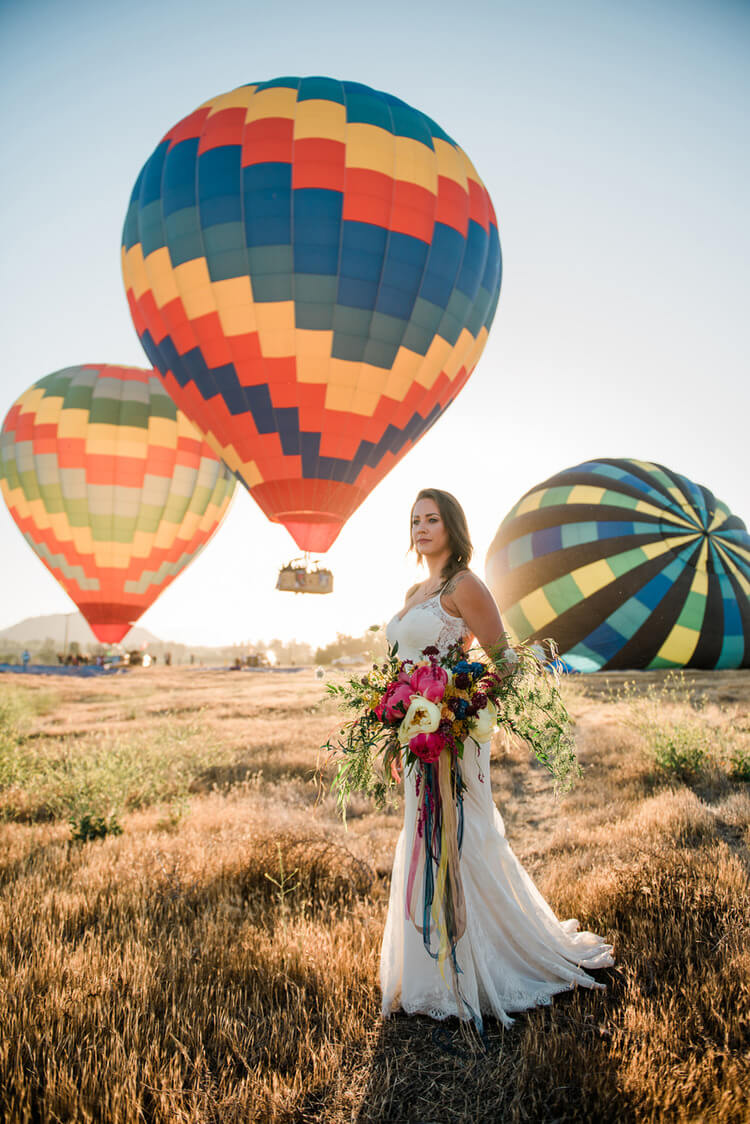
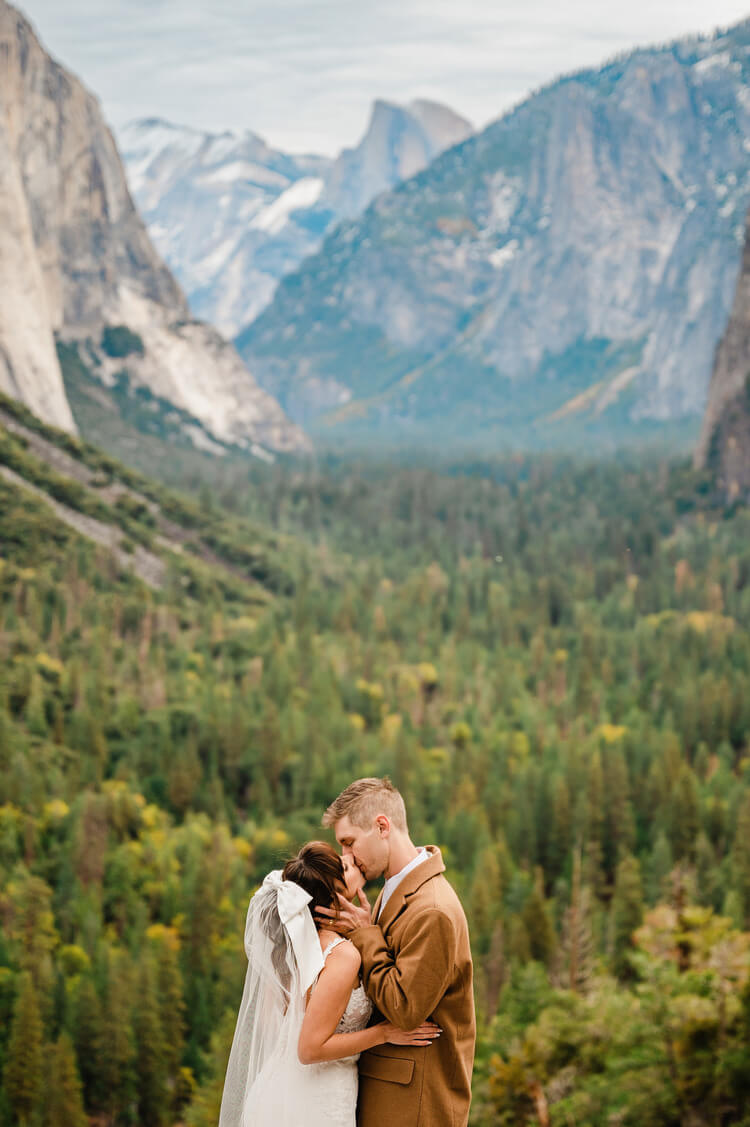


Things to Consider When Planning an Elopement
While elopements are much easier to plan than a traditional wedding, that doesn’t mean there aren’t some logistics to consider.
Here’s a list of what you’ll need to figure out in order to elope. However, by hiring an experienced elopement photographer, you’ll remove a lot of the stress and uncertainties of trying to figure everything out yourself!
- Brainstorm locations + dates/seasons (can be general, like “CO mountains/summer”): Consider factors such as weather, season, and any scheduling constraints you may have. Keep in mind that popular elopement destinations may have peak seasons with higher demand.
- Guest Count: Decide whether you want to elope alone or invite a small group of close friends and family members to share in your celebration. Keep in mind that elopements are typically intimate affairs, so limit your guest list accordingly.
- Research, interview, and select your elopement photographer: It’s important to figure out what you want in your photographer. To start, begin searching for photographers and see what sticks out the most to you. Before hiring, things to consider are: experience, both photography and editing style, what their packages include (Location and/or timeline planning assistance? Permits? Travel fees?)
- Finalize your location(s) + elopement day activities besides the ceremony: Choose a location that holds significance for you as a couple or reflects the atmosphere you envision for your elopement. Consider factors such as scenery, accessibility, legal requirements for marriage, and any permits or permissions needed for the location.
- Apply for permits: Special Event/Use permits are often required by venues or locations that regulate wedding and elopement ceremonies. Additionally, photography permits are typically required for professional photographers who wish to conduct photoshoots, including general portraiture, on their property/land. Your photographer should be fully insured so they can apply for any that are required.
- Create your elopement day timeline: Work with your photographer to come up with a timeline that ensures you won’t be rushed and you’ll be in all of the right places for the best lighting conditions. Also, incorporate personal touches into your elopement to make it meaningful and memorable. This could include writing your own vows, selecting meaningful music, or including symbolic rituals or traditions.
- Hire other vendors: Your photographer may have a list of local vendors that she can share with you to reduce the amount of time you spend searching yourself. Also, if you’re working with vendors such as videographers, officiants, or caterers at your elopement destination, communicate your travel plans and coordinate logistics with them to ensure everything aligns smoothly on the day of your ceremony.
- Book travel + accommodations: Explore transportation options to reach your chosen destination, whether it’s by plane, train, car, or other means. Compare prices, travel times, and available routes to find the best option for you and your partner. Research accommodation options in your elopement destination, such as hotels, resorts, vacation rentals, or bed and breakfasts. Look for accommodations that suit your preferences, budget, and proximity to your ceremony location. Book your accommodations well in advance to ensure availability, especially if you’re traveling during peak seasons.
Things to Consider When Planning an Elopement
While elopements are much easier to plan than a traditional wedding, that doesn’t mean there aren’t some logistics to consider.
Here’s a list of what you’ll need to figure out in order to elope. However, by hiring an experienced elopement photographer, you’ll remove a lot of the stress and uncertainties of trying to figure everything out yourself!
- Brainstorm locations + dates/seasons (can be general, like “CO mountains/summer”): Consider factors such as weather, season, and any scheduling constraints you may have. Keep in mind that popular elopement destinations may have peak seasons with higher demand.
- Guest Count: Decide whether you want to elope alone or invite a small group of close friends and family members to share in your celebration. Keep in mind that elopements are typically intimate affairs, so limit your guest list accordingly.
- Research, interview, and select your elopement photographer: It’s important to figure out what you want in your photographer. To start, begin searching for photographers and see what sticks out the most to you. Before hiring, things to consider are: experience, both photography and editing style, what their packages include (Location and/or timeline planning assistance? Permits? Travel fees?)
- Finalize your location(s) + elopement day activities besides the ceremony: Choose a location that holds significance for you as a couple or reflects the atmosphere you envision for your elopement. Consider factors such as scenery, accessibility, legal requirements for marriage, and any permits or permissions needed for the location.
- Apply for permits: Special Event/Use permits are often required by venues or locations that regulate wedding and elopement ceremonies. Additionally, photography permits are typically required for professional photographers who wish to conduct photoshoots, including general portraiture, on their property/land. Your photographer should be fully insured so they can apply for any that are required.
- Create your elopement day timeline: Work with your photographer to come up with a timeline that ensures you won’t be rushed and you’ll be in all of the right places for the best lighting conditions. Also, incorporate personal touches into your elopement to make it meaningful and memorable. This could include writing your own vows, selecting meaningful music, or including symbolic rituals or traditions.
- Hire other vendors: Your photographer may have a list of local vendors that she can share with you to reduce the amount of time you spend searching yourself. Also, if you’re working with vendors such as videographers, officiants, or caterers at your elopement destination, communicate your travel plans and coordinate logistics with them to ensure everything aligns smoothly on the day of your ceremony.
- Book travel + accommodations: Explore transportation options to reach your chosen destination, whether it’s by plane, train, car, or other means. Compare prices, travel times, and available routes to find the best option for you and your partner. Research accommodation options in your elopement destination, such as hotels, resorts, vacation rentals, or bed and breakfasts. Look for accommodations that suit your preferences, budget, and proximity to your ceremony location. Book your accommodations well in advance to ensure availability, especially if you’re traveling during peak seasons.
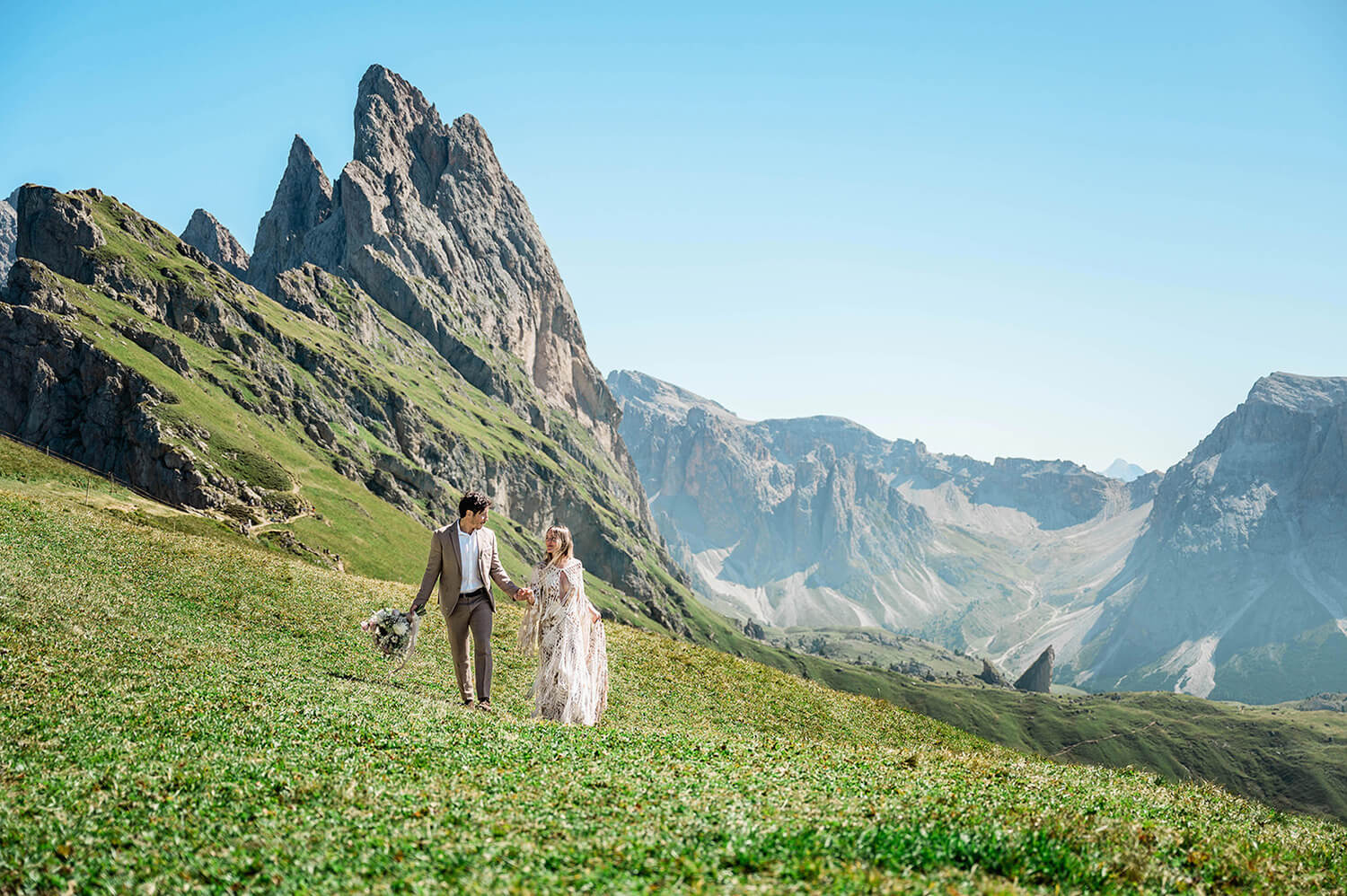
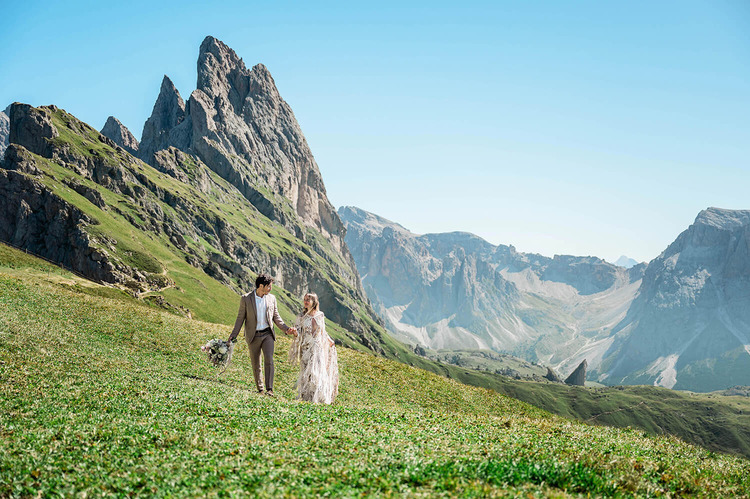
Also, please make sure to plan to follow the principles of Leave No Trace. As elopements and intimate weddings have grown in popularity, so too have the impacts to the environments in which these are held. As a result of this, many places have started restricting when and where you can elope on public lands.
These are the 7 principles of LNT:
- Leave what you find
- Respect wildlife
- Plan ahead & prepare
- Travel & camp on durable surfaces
- Dispose of waste properly
- Be considerate of other visitors
- Minimize campfire impacts
As a general rule of thumb, if you’re hoping to get married in nature you will likely need to keep your total headcount to 15 or fewer in order to avoid incurring any damage to the surroundings. However, some parks, like Yosemite, do have designated locations where you can safely fit more people, but they must be reserved in advance and often book up early during the busy season!
Also, please make sure to plan to follow the principles of Leave No Trace. As elopements and intimate weddings have grown in popularity, so too have the impacts to the environments in which these are held. As a result of this, many places have started restricting when and where you can elope on public lands.
These are the 7 principles of LNT:
- Leave what you find
- Respect wildlife
- Plan ahead & prepare
- Travel & camp on durable surfaces
- Dispose of waste properly
- Be considerate of other visitors
- Minimize campfire impacts
As a general rule of thumb, if you’re hoping to get married in nature you will likely need to keep your total headcount to 15 or fewer in order to avoid incurring any damage to the surroundings. However, some parks, like Yosemite, do have designated locations where you can safely fit more people, but they must be reserved in advance and often book up early during the busy season!
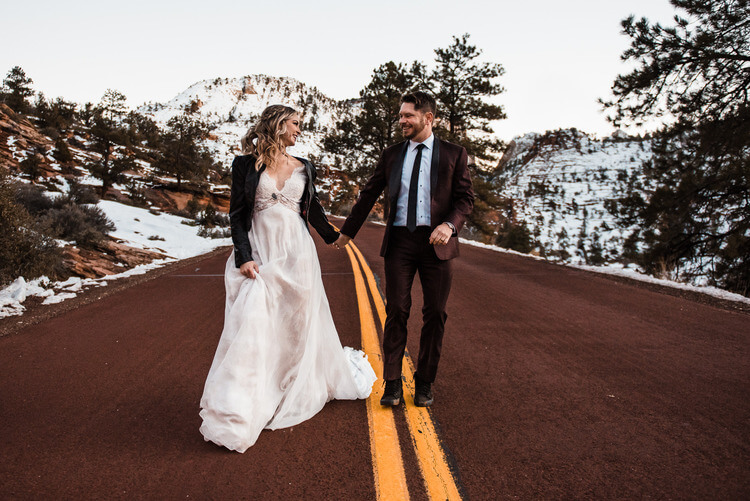
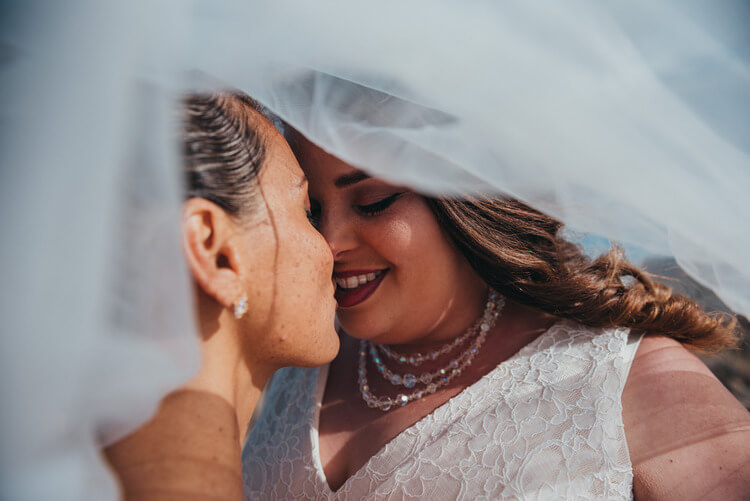


More Information on Eloping
If you’re still looking for more information on how to elope, I have a few other resources you can check out! Return to my blog home page to check out the different posts that might provide a bit more direction and assistance. Or, if you’re ready to move forward with an elopement photographer who can help guide you through the process, feel free to contact me on the form below!
More Information on Eloping
If you’re still looking for more information on how to elope, I have a few other resources you can check out! Return to my blog home page to check out the different posts that might provide a bit more direction and assistance. Or, if you’re ready to move forward with an elopement photographer who can help guide you through the process, feel free to contact me on the form below!
Here are a few other posts you may enjoy:
California has an abundance of top elopement locations. This curated list will help you narrow down your search.
Known for breathtaking views of the rocky Pacific coastline and majestic redwood forests, it’s no wonder why so many…
Here are a few other posts you may enjoy:
California has an abundance of top elopement locations. This curated list will help you narrow down your search.
Known for breathtaking views of the rocky Pacific coastline and majestic redwood forests, it’s no wonder why so many…
check me out on instagram!



Pretty/Bold Photography captures unforgettable, adventurous elopements set against stunning backdrops in destinations worldwide.


All love is celebrated here!
Contact Lisa
Practicing Leave No Trace in California Colorado New England Oregon Washington + Beyond
check me out on instagram!
Contact Lisa
Practicing Leave No Trace in California Colorado New England Oregon Washington + Beyond
Pretty/Bold Photography captures unforgettable, adventurous elopements set against stunning backdrops in destinations worldwide.




All love is celebrated here!
